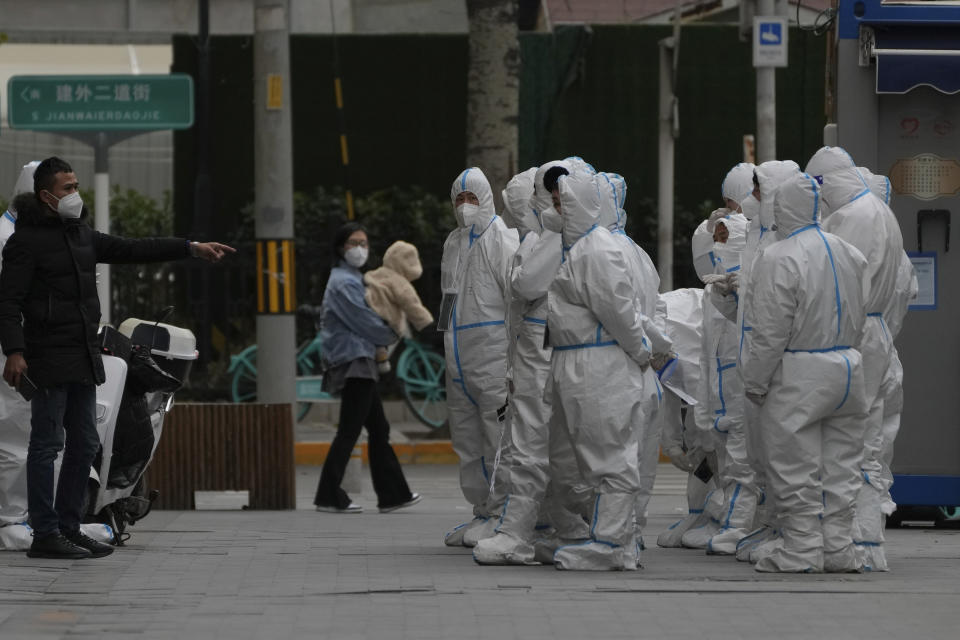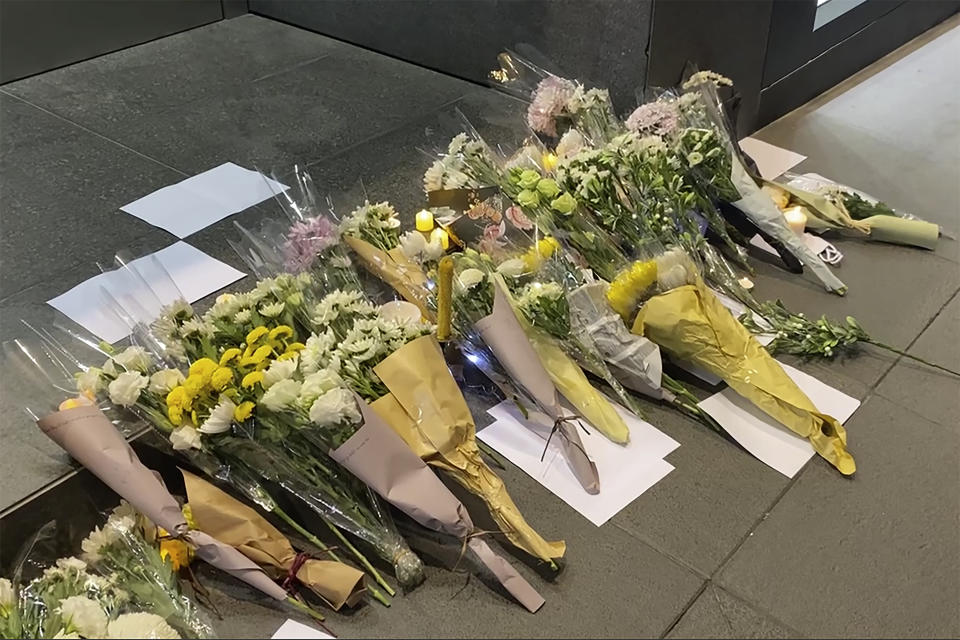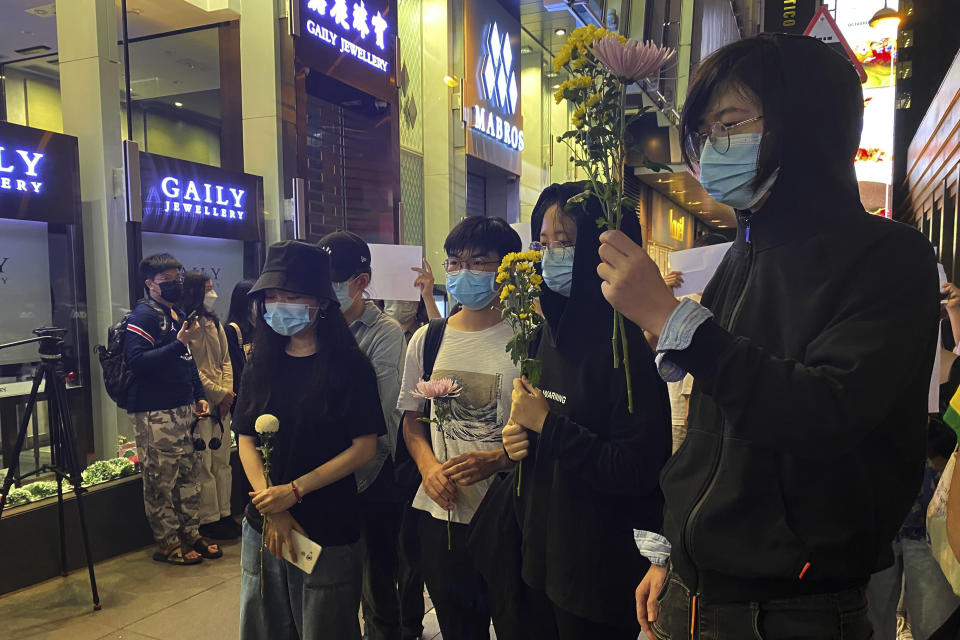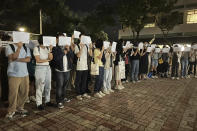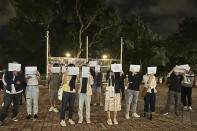China lockdown protests pause as police flood city streets
HONG KONG (AP) — With police out in force, there was no word of additional protests against strict government anti-pandemic measures Tuesday in Beijing, as temperatures fell well below freezing. Shanghai, Nanjing and other cities where online calls to gather had been issued were also reportedly quiet.
Rallies against China’s unusually strict anti-virus measures spread to several cities over the weekend in the biggest show of opposition to the ruling Communist Party in decades. Authorities eased some regulations, apparently to try to quell public anger, but the government showed no sign of backing down on its larger coronavirus strategy, and analysts expect authorities to quickly silence the dissent.
Police were checking making random checks on phones at the People’s Square subway station in Shanghai Monday evening, an eyewitness said. The person declined to give his name out of fear of retribution, as he was en route to a planned protest near the station, which he did not find.
In Hong Kong Monday, about 50 students from mainland China sang at the Chinese University of Hong Kong and some lit candles in a show of support for those in mainland cities who demonstrated against restrictions that have confined millions to their homes. Hiding their faces to avoid official retaliation, the students chanted, “No PCR tests but freedom!” and “Oppose dictatorship, don’t be slaves!”
The gathering and a similar one elsewhere in Hong Kong were the biggest protests there in more than a year under rules imposed to crush a pro-democracy movement in the territory, which is Chinese but has a separate legal system from the mainland.
“I’ve wanted to speak up for a long time, but I did not get the chance to,” said James Cai, a 29-year-old from Shanghai who attended a Hong Kong protest and held up a piece of white paper, a symbol of defiance against the ruling party’s pervasive censorship. ”If people in the mainland can’t tolerate it anymore, then I cannot as well.”
It wasn’t clear how many people have been detained since the protests began in the mainland Friday, sparked by anger over the deaths of 10 people in a fire in the northwestern city of Urumqi. That prompted angry questions online about whether firefighters or victims trying to escape were blocked by locked doors or other anti-virus controls. Authorities denied that, but the incident became a target for public frustration about the controls.
Without mentioning the protests, the criticism of Xi or the fire, some local authorities eased restrictions Monday.
The city government of Beijing announced it would no longer set up gates to block access to apartment compounds where infections are found.
“Passages must remain clear for medical transportation, emergency escapes and rescues,” said Wang Daguang, a city official in charge of epidemic control, according to the official China News Service.
Guangzhou, a manufacturing and trade center that is the biggest hot spot in China’s latest wave of infections, announced some residents will no longer be required to undergo mass testing.
The U.S. Embassy advised citizens to prepare for all eventualities and said Ambassador Nicholas Burns and other American diplomats have “regularly raised our concerns on many of these issues directly."
“We encourage all U.S. citizens to keep a 14-day supply of medications, bottled water, and food for yourself and any members of your household," the Embassy said in a statement Monday.
In Washington, White House National Security Council spokesman John Kirby “obviously, there are people in China that — that have — have concerns about that," referring to lockdowns.
“And they’re protesting that, and we believe they should be able to do that peacefully," Kirby said at a Monday briefing.
Urumqi, where the fire occurred, and another city in the Xinjiang region in the northwest announced markets and other businesses in areas deemed at low risk of infection would reopen this week and public bus service would resume.
“Zero COVID,” which aims to isolate every infected person, has helped to keep China’s case numbers lower than those of the United States and other major countries. But tolerance for the measures has flagged as people in some areas have been confined at home for up to four months and say they lack reliable access to food and medical supplies.
The ruling party promised last month to reduce disruption by changing quarantine and other rules known as the “20 Guidelines." But a spike in infections has prompted cities to tighten controls.
On Tuesday, the number of daily cases dipped slightly to 38,421 after setting new records over recent days. Of those, 34,860 were among people who showed no symptoms.
The ruling party newspaper People’s Daily called for its anti-virus strategy to be carried out effectively, indicating Xi’s government has no plans to change course.
“Facts have fully proved that each version of the prevention and control plan has withstood the test of practice,” a People’s Daily commentator wrote.
In Hong Kong, protesters at Chinese University put up posters that said, “Do Not Fear. Do Not Forget. Do Not Forgive,” and sang including “Do You Hear the People Sing?” from the musical “Les Miserables.” Most hid their faces behind blank white sheets of paper.
“I want to show my support,” said a 24-year-old mainland student who would identify herself only as G for fear of retaliation. “I care about things that I couldn’t get to know in the past.”
University security guards videotaped the event but there was no sign of police.
At an event in Central, a business district, about four dozen protesters held up blank sheets of paper and flowers in what they said was mourning for the fire victims in Urumqi and others who have died as a result of “zero COVID” policies.
Police cordoned off an area around protesters, who stood in small, separate groups to avoid violating pandemic rules that bar gatherings of more than 12 people. Police took identity details of participants but there were no arrests.
Hong Kong has tightened security controls and rolled back Western-style civil liberties since China launched a campaign in 2019 to crush a pro-democracy movement. The territory has its own anti-virus strategy that is separate from the mainland.
Hong Kong's Chief Executive John Lee is a law-and-order hardliner who led the crackdown on protesters, including on university campuses.
Both the Hong Kong government and the State Council, China's Cabinet, issued statements Monday pledging to uphold public order and the authority of the National Security Law, which gives authorities sweeping powers to charge demonstrators with crimes including sedition.
Protests also occurred over the weekend in Guangzhou near Hong Kong, Chengdu and Chongqing in the southwest, and Nanjing in the east, according to witnesses and video on social media. Guangzhou has seen earlier violent confrontations between police and residents protesting quarantines.
Most protesters have complained about excessive restrictions, but some turned their anger at Xi, China's most powerful leader since at least the 1980s. In a video that was verified by The Associated Press, a crowd in Shanghai on Saturday chanted, “Xi Jinping! Step down! CCP! Step down!”
The British Broadcasting Corp. said one of its reporters was beaten, kicked, handcuffed and detained for several hours by Shanghai police but later released.
The BBC criticized what it said was Chinese authorities’ explanation that its reporter was detained to prevent him from contracting the coronavirus from the crowd. “We do not consider this a credible explanation,” the broadcaster said in a statement.
Chinese Ministry of Foreign Affairs spokesman Zhao Lijian said the BBC reporter failed to identify himself and “didn’t voluntarily present” his press credential.
“Foreign journalists need to consciously follow Chinese laws and regulations,” Zhao said.
Swiss broadcaster RTS said its correspondent and a cameraman were detained while doing a live broadcast but released a few minutes later. An AP journalist was detained but later released.
___
Associated Press writer Joe McDonald in Beijing contributed.

 Yahoo Finance
Yahoo Finance 
